
Friday, November 3, 2017
Ultra-Accurate Genome Sequencing and Haplotyping from Single Human Cells
An interdisciplinary team of researchers at the University of California San Diego has developed a technology for very accurate sequencing and haplotyping of genomes from single human cells. Their findings were published online in advance of the Proceedings of the National Academy of Sciences (PNAS)* print edition.
"Accurate sequencing of single cells will enable the identification of mutations that cause cancer and genetic disease," said senior author Kun Zhang, a professor of bioengineering in the UC San Diego Jacobs School of Engineering. "At the same time, precise haplotyping will allow for the genotyping of haplotypes, combinations of different genes or alleles as a group from either parent."

include first author and post-
doctoral scholar Eric Wai Keung
Chu (Bioengineering) and
Ph.D. student Peter Edge (CSE),
who works in School of Medicine.
Zhang's co-authors from the Department of Bioengineering include professor Xiaohua Huang and postdoctoral researcher and alumnus Wai Keung Chu (M.S., Ph.D. '11, '16), who is first author on the PNAS article. Collaborators on the research from the Department of Computer Science and Engineering (CSE) include professor Vineet Bafna, who is a bioinformatics expert in the Center for Microbiome Innovation, the CHO Systems Biology Center and the Qualcomm Institute, all at UC San Diego. Others from CSE include Ph.D. student Peter Edge, and CSE alumnus Vikas Bansal (Ph.D. '08), now a faculty-affiliate in CSE and professor of pediatrics in the UC San Diego School of Medicine. Adding to the project's interdisciplinary roots is Department of Electrical and Computer Engineering (ECE) alumnus Ho Suk Lee (M.S., Ph.D. '11, '15), now at Broadcom, who lent his expertise in microfluidic devices for single-cell analysis as well as years of working in the bioengineering labs of both professors Zhang and Huang.
Clinical applications of genome sequencing demand high accuracy in DNA sequencing. According to CSE's Bafna, until now, many applications were off-limits because current technologies were not accurate enough to be done at the level of the single human cell.
"Many individuals carry alleles that cause genetic disease or predispose them to cancer," said Bafna. "Each gene has two alleles, one from each parent. One of the alleles may contain disease-causing mutations. The carriers may be asymptomatic, but their offspring may show symptoms due to the combination of bad alleles or haplotypes from both parents."
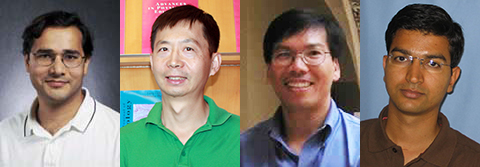
departments: (l-r): Vineet Bafna (CSE), Kun Zhang and Xiaohua Huang
(Bioengineering), and Vikas Bansal (Pediatrics and CSE affiliate).
Take the case of couples hoping to get pregnant via in-vitro fertilization (IVF). "For genetic diagnostics prior to IVF implantation, a human life is involved, so the utmost accuracy is required," explained bioengineering professor Xiaohua Huang. "With our technology, we can do highly accurate sequencing and haplotyping of the genome based on a single cell biopsied from early embryos."
In addition to IVF pre-implantation diagnostics and early cancer detection, other potential applications of the UC San Diego-developed technology include high-quality checking of genome-edited human cells for therapeutic purposes. "With the explosion in the use of CRISPR/Cas9 and other targeted genome-editing techniques, new treatments could be tweaked versions of the patient's own cells," said first author and bioengineering Ph.D. student Wai Keung Chu. "The technology makes it possible to use a single cell of the 'edited' gene and return results that would be as accurate as if we sequenced many cells."
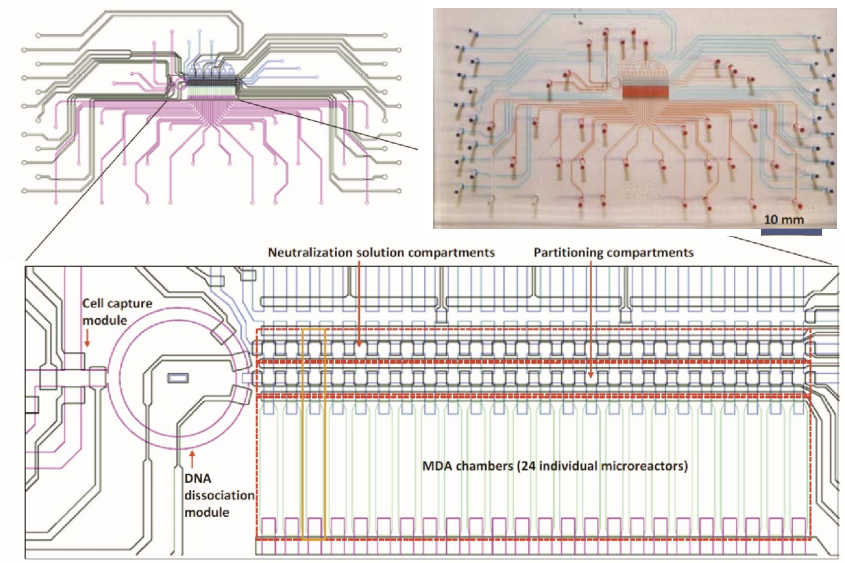
functional SISSOR device filled with dye solutions (red for
fluidic channels, blue for valves and valve lines); (c) zoom-
in view of regions with functional modules.
The technology in question has two novel aspects: a microfluidic processor that allows for the manipulation of single cells and separate chromosomal strands into different chambers; and computational methods that exploit the strand information for haplotyping and error correction. The UC San Diego scientists have dubbed it "Single-Stranded Sequencing using micrOfluidic Reactors" (SISSOR).
"Essentially it enables the simultaneous sequencing of very long fragments of all four strands of the chromosomal DNA from both parents," explained CSE bioinformatics Ph.D. student Peter Edge, who works in Pediatrics professor Vikas Bansal's Genome Information Science lab. "This allows us to make comparisons and correct for errors."
The SISSOR technique also breaks what has been called the 'curse of polymerases', which introduce errors when making copies of DNA. Unfortunately, noted CSE's Bafna, "we cannot read genome information from single cells without polymerases, so we had to come up with a solution that gets rid of those errors."
Based on their findings, the PNAS paper's co-authors were able to demonstrate "the most accurate single-cell genome sequencing to date."
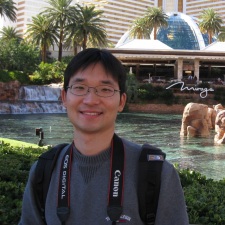
Lee co-authored the PNAS
paper. Lee is a UCSD ECE
alumnus (MS, PhD ’11, ’15)
Senior author Kun Zhang says the interdisciplinary nature of the research collaboration was critical to finding a more precise way to sequence DNA from single cells. "Our approach can simultaneously provide higher accuracy and longer haplotypes than other existing approaches," concluded Zhang. "This innovation required expertise that goes beyond what normally exists in a single department, and this case is a testament to UC San Diego's growing interdisciplinary research culture that allowed us to pull in collaborators from other departments who were critical to a technology whose payoff will hopefully be measured in lives saved - and perhaps more healthy children born via in-vitro fertilization."
________
*PNAS Paper: Ultra-accurate Genome Sequencing and Haplotyping of Single Human Cells, by Wai Keung Chu, Peter Edge, Ho Suk Lee, Vikas Bansal, Vineet Bafna, Xiaohua Huang and Kun Zhang, Proceedings of the National Academy of Sciences, October 24, 2017, doi:10.1073/pnas.
Earth Microbiome Project Releases Preliminary Findings Based on Over 27,000 Samples

Mini-Symposium on November 1.
The Center for Microbiome Innovation (CMI), led by Pediatrics and Computer Science and Engineering professor Rob Knight, hosted a mini-symposium Nov. 1 in the Qualcomm Institute. Knight welcomed attendees at the first public presentation of preliminary findings of the Earth Microbiome Project, and the mini-symposium was timed to coincide with the publication in the journal Nature of results from work undertaken by the international effort begun in 2010. The paper was co-authored by more than 300 researchers at over 160 institutions worldwide.
The Earth Microbiome Project (EMP) is a large-scale study of microbial diversity based on the analysis of DNA sequences from samples submitted by scientists from around the globe. The project is building an open-access resource that Nature dubbed an "experimental tour de force." EMP is co-led by researchers at the University of California San Diego, Pacific Northwest National Laboratory, University of Chicago, and Argonne National Laboratory. (UC San Diego also houses the American Gut Project, a crowdsourcing effort that grew out of the EMP, according to CMI and American Gut director Knight.)
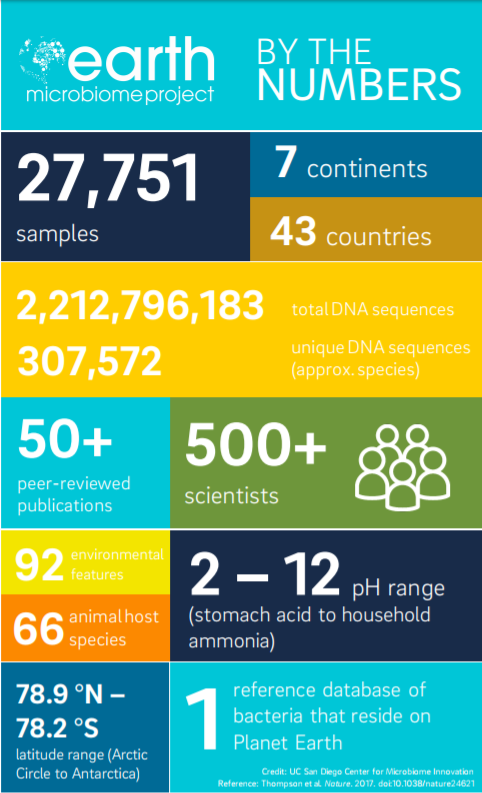
the Earth Microbiome Project published in
Nature Scientific Reports.
The deans of both the Jacobs School of Engineering and the UC San Diego School of Medicine gave opening remarks, but the task of presenting an overview of the Earth Microbiome Project fell to the CMI director. UC San Diego's Knight noted that "Earth is a microbial planet, with 100 million times as many bacteria on Earth than there are stars in the universe. That makes microbiomes the largest data set in any science." Microbiomes are unique collections of microbes living in each sample.
"Microbes are everywhere," said first author Luke Thompson, a former researcher in Knight's lab who is now a research associate at the National Oceanic and Atmospheric Administration (NOAA). "Yet prior to this massive undertaking, changes in microbial community composition were identified mainly by focusing on one sample type, one region at a time. This made it difficult to identify patterns across environments and geography to infer generalized principles."
Knight confirmed that the preliminary results published in Nature Nov. 1 are based on more than 27,000 samples collected via crowdsourcing from a vast number of different environments from 43 countries around the globe. (The samples came from 97 independent studies involving a wide range of geographic and environmental ecosystems, both on land and in marine environments.)
According to Knight, the scientific community really got behind the project. "Prior to this effort, the scientific literature only documented 202 environmental samples, for a total of 21,000 microbial DNA sequences. Now, we've collected more than 27,000 samples for a total of 2.2 billion sequences," he said. "This highlights one of the benefits of open-source scientific data. We wouldn't have been able to acquire these data any other way."
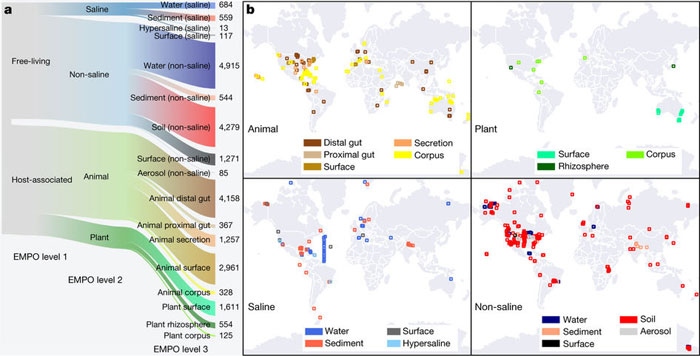
Project researchers generated the 2.2 billion DNA sequences for a highly variable region of a gene called 16S rRNA (a gene that encodes a component of the cell's protein synthesis machinery, the ribosome). The combined sequences represent the first reference database of bacteria covering the planet, and the paper represents the first major milestone toward the Earth Microbiome Project's long-term vision of constructing "the microbial map for planet Earth."
"The remarkable nature of this study lies not only in its scale and in the breadth of the environmental samples analyzed, but also in its methodology," noted Nature writer Jeroen Raes in an article released in connection with the new paper. "The project involved a massive, global crowdsourcing effort in which scientists raided their collection freezers for samples to share with the project."
The two-hour symposium was webcast in real time and distributed via Facebook Live. An archival record of the two-hour webcast is now available for on-demand viewing on the Facebook page of the Center for Microbiome Innovation.
___________________________
*Luke R. Thompson... Rob Knight & Earth Microbiome Project Consortium, A Communal Catalogue Reveals Earth's Multiscale Microbial Diversity, Nature, 1 November 2017.
Read the full news release on the CSE website.
Contextual Robotics Institute Director Honored with Endowed Chair in Robotic Systems
Computer Science and Engineering professor Henrik Christensen, an internationally renowned expert in robotics, has been appointed as the inaugural holder of the Qualcomm Chancellor's Endowed Chair in Robotic Systems at the University of California San Diego.
The chair was made possible by a generous $1 million gift from Qualcomm Incorporated and a $500,000 match from the campus Chancellor's Chair Challenge, a program created to support the recruitment and retention of quality tenured faculty. Christensen leads the Contextual Robotics Institute at UC San Diego. The gift contributes to the Campaign for UC San Diego.

Institute, holds the new Qualcomm Chancellor’s Endowed
Chair in Robotic Systems.
"This appointment acknowledges Henrik Christensen as a globally recognized and distinguished faculty member with a record of technical excellence in advanced robotics and as a researcher whose work has had a significant impact on industry," said UC San Diego Chancellor Pradeep K. Khosla.
Almost all funding that researchers receive is tied to deliverables, Christensen said. By contrast, endowed chair funds give researchers flexibility and freedom. The funds allow the Contextual Robotics Institute to build community here on campus, for example by organizing recruiting events and seminars.
"I am grateful to Qualcomm for its foresight in making this gift," Christensen said. "This will allow us to graduate engineers even better equipped for the workplace and continue to produce in-depth, cutting-edge robotics research."
Christensen came to UC San Diego in 2016 as a professor in the CSE department. As director of the Contextual Robotics Institute, he is focused on building and strengthening the robotics ecosystem in San Diego and the larger CaliBaja cross-border region.
San Diego is a leader in many key areas that are converging in robotics, including electronics, wireless, data science, biotech, defense, aerospace, medical devices, materials and medicine. San Diego also has the biggest healthcare system in California.
UC San Diego conducts robotics research in all these areas, from coordinating UAV (Unmanned Aerial Vehicle) swarms, to developing grippers and robotic hands, to investigating how robots can better interact with humans in health care and factory settings. This will lead to many fruitful partnerships, Christensen said.
"Qualcomm's generous support is critical to our efforts at UC San Diego to ensure that the San Diego region emerges as a global robotics leader," said Albert P. Pisano, dean of the UC San Diego Jacobs School of Engineering.
Part of Christensen's work through the Contextual Robotics Institute is to bring these communities together and build momentum for robotics in the region. The institute aims to be a hub that connects researchers to San Diego's various industry clusters, including aerospace, defense, biotech and wireless communication, Christensen said.
Christensen is a leader in the setting of national policy for the field of robotics and has testified before Congress on the subject. He is the head of a nationwide effort to draft a robotics roadmap for the future and explore the field's potential to transform U.S. society via new markets and industries; to create new jobs; and to address issues of national importance.
Christensen's own research covers computer vision, artificial intelligence and robotics, and his primary emphasis has been on a systems-oriented approach to machine perception, robotics and design of intelligent machines. He has worked with a number of industry partners, including Boeing, KUKA, iRobot, BMW and Apple. "We are trying to solve real problems with real solutions," he said.
Read the full news release on the CSE website.
Self-Driving Vehicles to Make Debut on UC San Diego Roads in January
UC San Diego will turn its campus into a test bed for self-driving vehicles starting in January 2018, according to CSE professor Henrik Christensen, who leads the project as director of the Contextual Robotics Institute.
The project will be implemented in stages. The first will be to put self-driving mail delivery carts on the road. The carts will run on algorithms developed by UC San Diego researchers who are part of the Contextual Robotics Institute. Back-up drivers will initially ride in the carts as a safety measure.

from right) with campus officials (at left) and mail cart to be used in
UC San Diego self-driving campus trials in 2018. Far right:
Contextual Robotics Institute executive director Todd Hylton.
"We are trying to solve the 'last mile' problem, when autonomous vehicles get off the freeway and onto crowded neighborhood streets," said Christensen.
The campus is like a small city, Christensen added, with about 65,000 students, faculty and staff coming together every day and vehicles, bikes and pedestrians sharing the same space. The project is a partnership with UC San Diego Business and Financial Services. "We are turning the campus into a living laboratory," Christensen said.
He announced details of the project during the Contextual Robotics Forum Oct. 27 on the campus.
In the future, the project's goal is to incorporate new technologies being developed at UC San Diego and broaden the scope of the test bed. The Jacobs School of Engineering is a leader in advanced wireless technologies, and some of these could make their way into the mail delivery carts. For example, carts could be equipped with radar technology developed by electrical engineering professor Gabriel Rebeiz and his team . Another possibility: vehicle-to-vehicle communication technologies developed by a team led by Sujit Dey, who is an electrical engineering professor at the Jacobs School, director of the UC San Diego Center for Wireless Communications, and director of the UC San Diego Institute for the Global Entrepreneur.
Christensen and his team chose mail delivery as the first phase of the project because it's exactly the kind of repetitive task that robots excel at. The self-driving carts will make 13 different stops at drop points on campus, where employees come to pick up mail and distribute it to specific departments. The stops are set to occur at specific preset times.
As a first step, researchers will purchase two Polaris Ranger carts. The vehicles will be equipped with a panoply of sensors for self-driving vehicles provided by Illinois-based Autonomous Stuff as well as an open source software package, which will be supplemented by algorithms developed by Christensen and his team.
The researchers' initial goals are predicting pedestrians' movements five seconds out and predicting when surrounding vehicles are going to stop. Researchers will also build a simulated environment that mimics traffic patterns on the UC San Diego campus.
Christensen and colleagues will also partner with cognitive scientists on campus, as well as the UC San Diego Design Lab, to study how pedestrians interact with self-driving vehicles.
Long-term plans include operating self-driving carts to ferry people from the new trolley stations that will open on campus in 2021 to medical facilities on the east side of the UC San Diego campus. Christensen also envisions early testing taking visitors from the Birch Aquarium parking lot to the aquarium's entrance.
The initial costs for the project, $150,000, is covered by Christensen's start-up research funding provided by the Jacobs School of Engineering.
The project is a partnership with Integrated Procure-to-Pay Solutions, which is part of Business and Financial Services here on campus.
UC San Diego Ranked #6 University Worldwide for High-Quality Science
The University of California San Diego ranked 6th among leading research institutions in the world for "high-quality science," based on its research publications in highly selective science journals.
The global assessment and rankings were conducted by Nature Index, a database of author affiliations and institutional relationships, and the ranking appeared in a supplement to the latest issue of the scientific journal Nature.
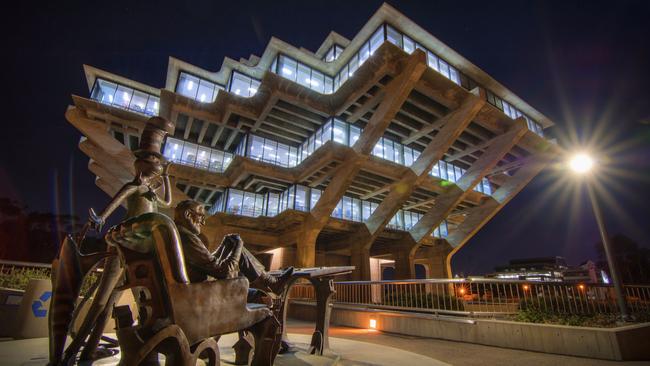
The rankings were determined by assessing publications in leading science journals from research institutions around the world over the most recent five years ending December 31, 2016.
UC San Diego was ranked 3rd best in California, behind Stanford University and UC Berkeley, and ahead of Caltech, UCLA, UC San Francisco and UC Santa Barbara.
The top-ranked institutions in the global list ahead of UC San Diego were, in order, Harvard University, Stanford University, MIT, UC Berkeley and Yale University.
"Our stellar position in this global ranking speaks volumes about the exceptional quality of the research conducted at UC San Diego, as well as the exceptional talents of our faculty and other researchers on campus," said Chancellor Pradeep K. Khosla.
"UC San Diego's consistently high ranking in this global indicator of high-quality research, and other global assessments of our research enterprise, demonstrate that the public investments made in our research and education enterprise are being maximized on our campus," said Vice Chancellor for Research Sandra A. Brown.
Last month, the campus was recognized by U.S. News and World Report as the nation's 5th best public university in its fourth annual global rankings, which measure factors such as research, global and regional reputation; international collaboration; as well as the number of highly-cited papers and doctorates awarded.
|
UPCOMING EVENTS |
FRIDAY, NOVEMBER 3, 2017
Hierarchical Learning and Inference in the Internet of Things
The Database Seminar Series continues on Friday with a presentation by CSE second-year M.S. student Anthony Thomas on hierarchical learning and inference, particularly regarding the Internet of Things.
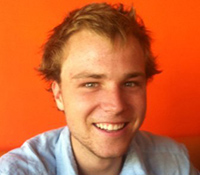
Date: Friday, November 3, 2017
Time: 1:00pm
Location: Room 1242, CSE Building
Abstract: The Internet of Things (IOT) describes a large distributed ensemble of sensor enabled devices. IOT applications provide unique opportunities to leverage real-time data collected over a wide geographic area. Recent research has showcased the potential of IOT for a wide range of projects from reducing energy consumption in "smart cities" to fine grained monitoring of environmental pollution. Leveraging the potential of IOT data will require advances in machine learning to address the novel constraints imposed by IOT networks. Current state of the art consists mainly of exporting data gathered on sensors to the cloud for inference and estimation. This monolithic design may entail prohibitively high rates of communication between sensors and the cloud and lead to privacy concerns about data storage. In this talk I will discuss ongoing research which aims to leverage a modular architecture for IOT applications and allow computations to be performed closer to the data. Pushing computation down the network hierarchy both serves to reduce communication overhead and may ameliorate user concerns about privacy and data locality. I will discuss challenges in reformulating machine learning models to be hierarchy aware and possible techniques to overcome these issues.
Bio: Anthony Thomas is an M.S. student at UC San Diego in Computer Science and Engineering who earned his undergraduate degree from UC Berkeley. His interests are at the intersection of statistics and data management, and in particular the use of data to answer questions about human behavior and public policy. Thomas has a diverse academic background in computer science, statistics and economics, and prior to graduate school, he worked at a computational researcher focusing on behavioral economics and policy research. The emergence of large data sets for economic and psychological research has provided a novel high resolution lens onto the behavior of individuals, but leveraging these resources requires interaction with large and complex data. Thomas's goal is to provide computational researchers with tools that allow them to interact effectively with these data.
Faculty Host: CSE Prof. Yannis Papakonstantinou
MONDAY, NOVEMBER 6, 2017
Human-AI Interaction: Autonomous Service Robots
The CSE Distinguished Lecture Series continues with a talk by Carnegie Mellon University professor of computer science Manuela Veloso, whose research focuses on autonomous mobile robots and interaction between humans and artificial intelligence.
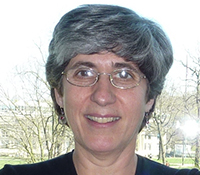
Date: Monday, November 6, 2017
Time: 11:00am
Location: Room 1202, CSE Building
Abstract: We research on autonomous mobile robots that attend to task requests from humans, such as transporting an item between locations, and guiding people to a destination. Concretely, in this talk, I will present our CoBot mobile service robots and their symbiotic autonomy, which enables the robots to ask for help to overcome their perceptual, cognitive, and actuation limitations. I will then introduce the challenges of a broad human-AI interaction. The talk will introduce how humans and AI can collaborate, in a variety of ways, in particular in terms of robot learning from human sources, and robot explanation generation to respond to language-based requests about their autonomous experience. I will address the opportunities for transparency and trust in AI systems.
Bio: Manuela M. Veloso is the Herbert A. Simon University Professor in the School of Computer Science at Carnegie Mellon University. She is the Head of the Machine Learning Department, with joint appointments in the Computer Science Department, in the Robotics Institute, and in the Electrical and Computer Engineering Department. She researches in Artificial Intelligence with focus in robotics, machine learning, and multiagent systems. She founded and directs the CORAL research laboratory, for the study of autonomous agents that Collaborate, Observe, Reason, Act, and Learn, www.cs.cmu.edu/~coral . Professor Veloso is ACM Fellow, IEEE Fellow, AAAS Fellow, AAAI Fellow, Einstein Chair Professor, the co-founder and past President of RoboCup, and past President of AAAI. Professor Veloso and her students research with a variety of autonomous robots, including mobile service robots and soccer robots. Seewww.cs.cmu.edu/~mmv for further information, including publications.
Faculty Host: Laurel Riek
MONDAY, NOVEMBER 6, 2017
A Fast Polynomial Space Algorithm for Subset Sum
As part of the CSE Theory Seminar Series for Fall 2017, Eindhoven University of Technology (TU Eindhoven) professor Nikhil Bansal will be the next speaker in the series.

Date: Monday, November 6, 2017
Time: 2:00pm
Location: Room 4258, CSE Building
Abstract: TU Eindhoven professor Nikhil Bansal will describe an algorithm for the subset sum problem that runs in 2^{0.86n} time and uses polynomial space, assuming read-only random access to exponentially many random bits. Previously, all algorithms with running time less than 2^n used exponential space, and obtaining such a guarantee was open. Our algorithm is based on Floyd's space efficient technique for cycle finding and some additive combinatorics of subset sums.
Bansal's talk is based on joint work with Shashwat Garg, Jesper Nederlof and Nikhil Vyas.
Bio: Nikhil Bansal is a Professor in the Department of Mathematics and Computer Science at Eindhoven University of Technology. In 1999 he earned his Bachelor's degree in Computer Science at IIT Mumbai, and obtained his Ph.D. from Carnegie Mellon University in 2003. Professor Bansal worked at the IBM T.J. Watson Research Center until 2011, where he managed the Algorithms group. He is broadly interested in theoretical computer science with a focus on the design and analysis of algorithms for discrete optimization problems. He also works in related areas including discrete math, complexity theory and machine learning and probability. Bansal has received several best- paper awards for his work and he is on the editorial boards of several journals. He is also the recipient of a NWO Vidi grant, an ERC consolidator grant and an NWO TOP grant.
WEDNESDAY, NOVEMBER 8, 2017
The Hearts and Minds of Data Science
University of Washington professor of human-centered design and engineering Cecilia Aragon will discuss a human-centered approach to data science in this instalment of the Design Lab's Design@Large lecture series.

Date: Wednesday, November 8, 2017
Time: 4:00pm
Location: Room 1202, CSE Building
Abstract: Extraordinary advances in our ability to acquire and generate data are transforming the fundamental nature of discovery across domains. Much of the research in the field of data science has focused on automated methods of analyzing data such as machine learning and new database techniques. However, the human aspects of data science, including how to maximize scientific creativity and human insight, how to address ethical concerns, and the consideration of societal impacts, are vital to the future of data science. Human-centered data science is a necessary part of the success of 21st century discovery. I will discuss promising research in this area, describe ongoing initiatives at the UW eScience Institute, and speculate upon future directions for data science.
Bio: Cecilia Aragon is a Professor in the Department of Human Centered Design & Engineering, Senior Data Science Fellow at the eScience Institute, and Director of the Human Centered Data Science Lab at the University of Washington in Seattle. She earned her Ph.D. in computer science from UC Berkeley in 2004. Her research focuses on human-centered data science, an emerging field at the intersection of computer-supported cooperative work (CSCW) and the statistical and computational techniques of data science. She has published over 200 papers in the areas of HCI, CSCW, data science, visual analytics, machine learning, and astrophysics. In 2008, she received the Presidential Early Career Award for Scientists and Engineers (PECASE), the highest honor bestowed by the US government on outstanding scientists in the early stages of their careers. Lab Website Faculty Profile
ALUMNI SURVEY
Take the CSE Alumni Survey. It only takes a few minutes. We'd really like to hear from you!
GIVING OPPORTUNITIES |

